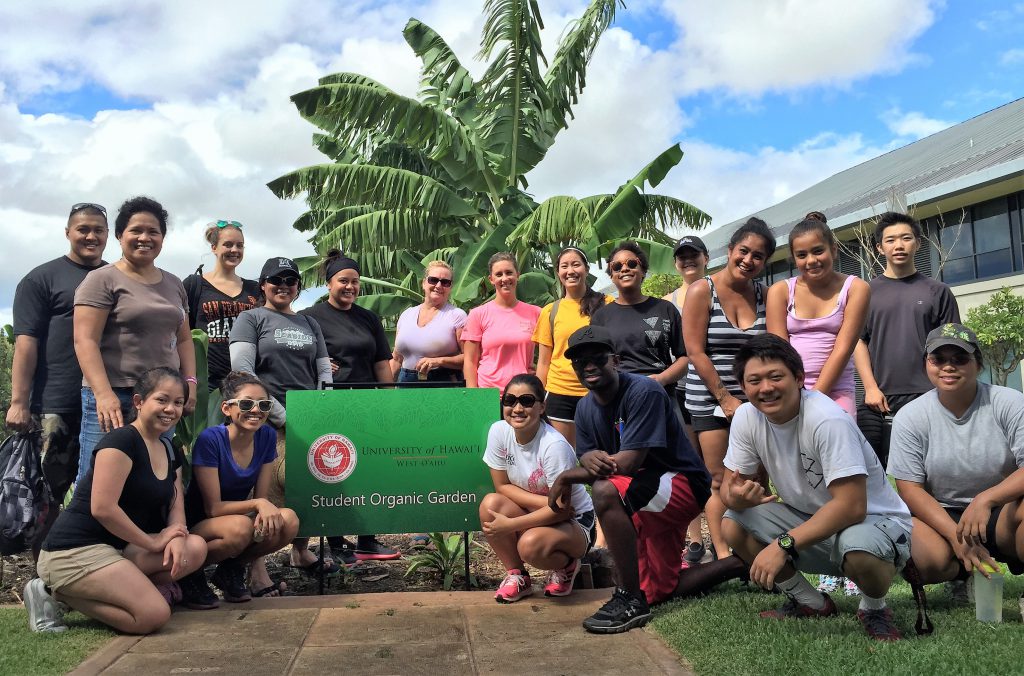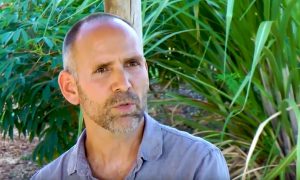
A work party at the UH West Oʻahu Student Organic Garden
A new book on Hawaiʻi’s evolving local food system includes an examination of UH West Oʻahuʻs Sustainable Community Food Systems and its ties to the pioneering community-based organic farming social enterprise in Waiʻanae, MAʻO Organic Farms.
Nourish: The Revitalization of Foodways in Hawaiʻi, includes a chapter titled “After the Plantations: Restoring Ancestral Abundance Through Food System Change in Hawaiʻi,” which explores the demise of sugar and pineapple plantations, the efforts by MAʻO Farms to become a center of Hawaiʻiʻs ecologically sustainable food movement, and the establishing of the Sustainable Community Food Systems program at UH West Oʻahu. The chapterʻs authors are UH West Oʻahu Assistant Prof. Albie Miles along with MAʻO Organic Farms’ founders, Gary and Kukui Maunakea-Forth and its social enterprise director, Kamuela Joseph Nui Enos.

Dr. Albie Miles
Miles said the book was printed recently and can be ordered by emailing its editors at claregupta@gmail.com or gbostock@gmail.com.
The chapter explains that the demise of commercial sugar cane production in the state has opened up thousands of acres of agricultural land and presents an opportunity to reuse this and other idle land to achieve a new set of ecological, social, cultural and economic goals. The transformation of Hawaii’s food system, the authors note, also presents a chance to point Hawaiʻi toward a new food economy that integrates organic farming and higher education, job creation, Hawaiian culture, economic development and food security with community health and well-being, the authors wrote.
“Traditional ecological knowledge and indigenous farming systems that once fed a large and healthy pre-contact population are now being integrated into 21st century practice of conservation science and sustainability,” the authors state. “There is a growing social awareness and a commitment to restoring ecologically sustainable and community based food systems.”
The authors further note that MAʻO (Māla ʻAi ʻŌpio, or the garden that grows young people) has played a leading role in this movement, with its paid college internship program for local youth who manage the day-to-day operations of the the 25-acre certified organic farm. As part of the larger body of work on food system change in Hawaiʻi, the leadership team at MAʻO Farms worked with UH West Oʻahu to create the SCFS program and its trans-disciplinary and experiential curriculum.
“MAʻO Organic Farms and the Bachelor of Applied Science in Sustainable Community Food Systems at the University of Hawaiʻi-West Oʻahu represents a new and exciting model for university-community collaboration designed to solve a wide range of social, economic and ecological issues,” the authors conclude.
“The collaboration represents an unparalleled opportunity for the University of Hawaiʻi – an indigenous serving institution of higher learning – to work closely with the native Hawaiian community to simultaneously prepare students for 21st century jobs in agri-food system sustainability, increase social mobility, and honor the host culture.”
The book, edited by Dr. Clare Gupta and Gillian Bostock Ewing, examines different ways food self-sufficiency and agricultural sustainability are coming together in Hawaiʻi. The book includes several contributions from University of Hawaiʻi faculty, including those by University of Hawaiʻi at Manoaʻs Malia Akutagawa, Mary Mostafanezhad, Krisna Suryanata, and Mehana Vaughan. UH West Oahuʻs Emmalani Case and Aiko Yamashiro of UH Mānoa crafted the bookʻs conclusion.
